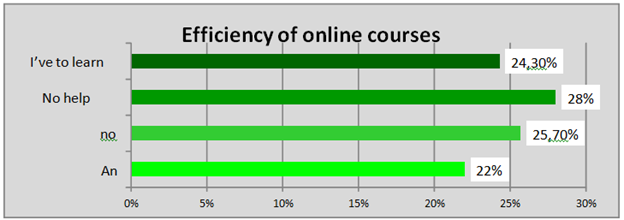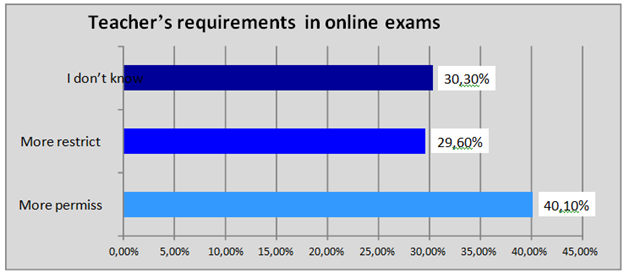MOJ
eISSN: 2574-9935


Short Communication Volume 6 Issue 2
Dunarea de Jos University of Galati, Romania
Correspondence: Nanu Liliana, Dunarea de Jos University of Galati, Romania
Received: June 16, 2023 | Published: June 28, 2023
Citation: Liliana N. The effects of online education on the professional development of FEFS students in the context of the covid-19 pandemic. MOJ Sports Med. 2023;6(2):75-77. DOI: 10.15406/mojsm.2023.06.00143
Since the beginning of the year 2020, mankind has faced a situation without precedent with the spread of the SARS-COV2 virus. Among the most affected sectors by the pandemic is that of education, particularly in the case of students and their professional development. This study sets out to determine the degree to which the pandemic has impacted the professional development of the students of the Physical Education and Sports College. The paper also aims to highlight the difficulties posed by the online nature of the course material and lessons in relation to aspects such as organizing, communicating, teaching, learning and evaluating the knowledge of the students during the past year. (March 2020- March 2021) In order to assess the difficulties faced by students and the impact of the COVID-19 pandemic on their professional development, a survey with multiple choice answers has been used.
For an honest collaboration, the respondents remained anonymous, although for a better understanding of the sample, questions with regards to gender, age and program me of choice were still asked. The survey has 12 questions with 3 or 4 possible choices and aims to determine the preferred methods of teaching and evaluation of the students with relation to their professional development.
Keywords: online learning, COVID-19 pandemic, professional development, students
Even though information with regards to the spread of the SARS-COV2 virus was made public by the World Health Organization only at the beginning of the year 2020,1 it is assumed that it started spreading in China near the end of 2019.2 From a medical standpoint, the virus is a respiratory infection that affects people in a variety of ways, and thus, it requires different approaches with concern to recovery and protection.
(https://www.synevo.ro/shop/arn-viral-sars- cov-2/).
In early March, 2020, Romanian authorities announced that schools and universities are to be closed and all courses are to be moved online. Both teachers and students were forced to adapt to the new reality imposed by the pandemic where both processes of studying and teaching have been affected. Based on that reality, this study intends to determine the impact of online studying as a result of measures taken during the Covid-19 Pandemic on the students of the College of Physical Education and Sport of Galati and their ability to study, acquire knowledge.3
The purpose of the questionnaire is to investigate and record the opinion of FEFS Galați (College of Physical Education and Sport of Galati) students on the effects of online education on their preparedness for the job market. The working hypothesis follows a similar goal, investigating the effects of online education on FEFS students with regards to their learning capacity.4
Research protocol
The research was conducted on a sample of 132 students (56 male, 76 female) of FEFS Galați, from Bachelors’ and Masters’ programmes in the field of Physical education and Kinesiotherapy, in the period April-June 2021 after the students of the faculty have carried out the didactic activity (courses, seminars, laboratories) in the online environment for one year (March 2020-March 2021).5
Subjects
Of the 132 investigated students, 75 (45 boys, 30 girls) majored in physical education and sports and 57 (11 boys, 46 girls) majored in physical therapy. Out of the 132 students investigated, over 70% are aged between 18 and 30 and 57,6% are female (Figure 1).
It is also worth mentioning that 78 participants are currently enrolled in Bachelor’s programmes (59%) while the other 54 are enrolled in Master’s programmes. 56,9% of the students included in the investigation are enrolled in the Physical education programme with the rest of them following a Kinesiotherapy programme (Figure 2).
Following the questioning process, the responses of the study participants were used to create a representative image of the influence of online studying on their professional preparedness.6 The preferences of the students with regards to the teaching/ learning process during the pandemic indicates that 39,7% of the respondents show a preference for physical, “face to face” teaching, while 34,8% are satisfied with the classes taking place in an online environment. The remaining 27,3 % of respondents show no preference for either method, claiming indifference (Figure 3).
Almost 30% of students claim to have had frequent difficulties participating in online classes due to technical issues, 43% rarely had any issues while 28% claim to have never had such problems with the online platform.
It is worth noting that 97% of respondents have the necessary equipment(phone, laptop, computer) to participate in online classes. When asked about their level of comprehension with regards to the online course material, over 40% of respondents were satisfied with the teaching tools/methods, 28% claim to have had difficulties understanding the course material with the tools provided, and almost 30% preferred not to answer. With regards to the degree of participation in online classes, 37,9% of respondents claim to be active during the class, 35% of the study participants are only sometimes active, while the other 27,3% are almost never active during the class.7
The effectiveness of online classes with regards to the professional development of students was gauged in the following manner: around 55% of participants believe online classes are of little to no use to their development and approximately 25% of them believe not being able to benefit from face to face interaction with the teacher has negatively impacted their learning process and consequently, the level of knowledge and the necessary skills they have amassed thus far (Figure 4).

Figure 4 Opinion of participants with regards to their professional development in the context of online classes.
When questioned about the time spent on individual studying, 36,3% of students claim to study around half an hour a day, with the same amount of participants studying about an hour. 27,4% haven’t spent any amount of time on individual studies. Linked to the aforementioned results, the degree to which students pass their courses indicates that 40% of respondents have no resits, 32% have one resit and 28% have more than one resit.8
The next question deals with the degree of strictness of teachers with regards to exams evaluated during the most recent online exam period: over 40% of students believe that teachers are less strict during online exams, almost 30% claimed they were on the contrary, more strict, and 30% weren’t sure how to answer, choosing option “c” (Figure 5).

Figure 5 Graphic regarding the teachers' requirements when evaluating knowledge in the online environment.
Interestingly enough, when asked about their preference with regards to how they undertake exams (either online or in person), out of the 132 respondents, 54 students (41%) said they preferred online exams to the traditional ones, 38 (28,7%) claimed they prefer to take exams in person while the remaining 40 students showed no preference for either method. On the last question concerning the degree of satisfaction of students with regards to the grades they obtained during the exam period and the knowledge obtained, over 46% of respondents declare themselves satisfied, 26,5 % were not happy with the results with the remaining respondents choosing option “c” : “not concerned”.9
None.
The author declares that there are no conflicts of interest.

©2023 Liliana. This is an open access article distributed under the terms of the, which permits unrestricted use, distribution, and build upon your work non-commercially.